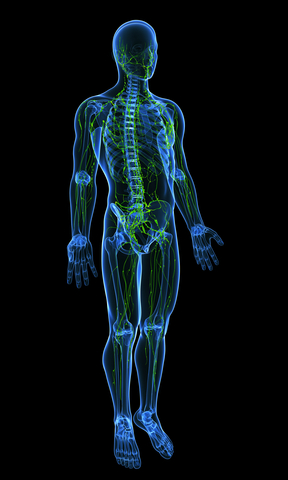 The lymphatic system is a very important component of the immune system that hasn't been given the attention that it deserves. In fact I have clinical physiology books that barely even mention it - so I want to bring it to your attention today. Running parallel to the body's blood system (arteries and veins) from the feet to the neck, the lymphatic system includes the lymphatic vessels and organs (lymph nodes, the thymus gland, spleen and tonsils). The blood system and the lymphatic system have a symbiotic relationship yet we generally do not hear as much about the lymphatic system as we do the blood system.
The lymphatic system is a very important component of the immune system that hasn't been given the attention that it deserves. In fact I have clinical physiology books that barely even mention it - so I want to bring it to your attention today. Running parallel to the body's blood system (arteries and veins) from the feet to the neck, the lymphatic system includes the lymphatic vessels and organs (lymph nodes, the thymus gland, spleen and tonsils). The blood system and the lymphatic system have a symbiotic relationship yet we generally do not hear as much about the lymphatic system as we do the blood system.
In the body there is a fluid known as interstitial fluid that is contained within the interstitium or space between the cells. This interstitial fluid enters into the lymphatic vessels and becomes a fluid known as lymph. The lymph flows upward throughout the body’s lymphatic system. But, instead of having a pump like the heart to push it throughout the lymphatic system, as blood is pumped throughout the blood system, the lymph is moved through the lymphatic system by muscle contractions. These muscle contractions move the lymph to the lymph nodes where it is filtered by cells called macrophages that function to eliminate bacteria, cellular debris and other foreign particles. Additionally the lymph nodes house B lymphocytes which are white blood cells that can detect the presence of viruses, bacteria, yeast and other microbiologic organisms and then initiate antibody production. The condition of your lymphatic system is a key indicator of your overall health and the ability for your body to heal itself. It is very
